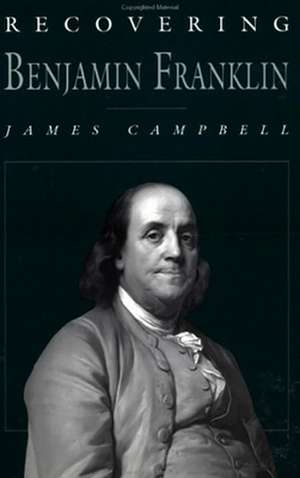Recovering Benjamin Franklin: Get Over Getting Older
Autor James Campbellen Limba Engleză Hardback – 21 ian 1999
Preț: 278.38 lei
Preț vechi: 361.86 lei
-23% Nou
Puncte Express: 418
Preț estimativ în valută:
53.27€ • 55.82$ • 44.04£
53.27€ • 55.82$ • 44.04£
Carte indisponibilă temporar
Doresc să fiu notificat când acest titlu va fi disponibil:
Se trimite...
Preluare comenzi: 021 569.72.76
Specificații
ISBN-13: 9780812693867
ISBN-10: 0812693868
Pagini: 324
Ilustrații: bibliography, index
Dimensiuni: 163 x 233 x 23 mm
Greutate: 0.56 kg
Editura: Open Court Publishing Company
ISBN-10: 0812693868
Pagini: 324
Ilustrații: bibliography, index
Dimensiuni: 163 x 233 x 23 mm
Greutate: 0.56 kg
Editura: Open Court Publishing Company
Descriere
Is Benjamin Franklin, the familiar cultural icon whose face appears on coins, currency, and postage stamps, in addition to being an affable inventor, printer, and humorist also an important American philosopher? In Recovering Benjamin Franklin, James Campbell attempts to "recover" Benjamin Franklin's role as philosopher. In the broad eighteenth-century understanding of the term "philosopher", most people would say that Franklin clearly qualifies as one. But since the beginning of the twentieth century, the meaning of the term has narrowed. What should be said about Franklin as philosopher in the current sense of the word?
Part of the problem is that Franklin's thought is difficult to classify. Franklin is not a composer of lengthy, systematic treatises. Instead, we know him as the author of letters and essays, primarily short and often fragmentary, that were intended for diverse audiences. Was Franklin a thinker whose interests were nearly universal, or was he a dabbler who flew from topic to topic? Was he a minor intellectual who was incapable of sustained theoretical work, or was he a thinker who recognized that thought must function in the world?
In answering these questions, Campbell provides a survey of the events in Franklin's rich life and explores his extraordinary place in American history, along the way challenging a series of popular misconceptions that are based upon narrow interpretations of Franklin's work. To foster a more adequate understanding, the author lays out in detail Franklin's ideas in four areas: science, religion, morality, and politics.
Part of the problem is that Franklin's thought is difficult to classify. Franklin is not a composer of lengthy, systematic treatises. Instead, we know him as the author of letters and essays, primarily short and often fragmentary, that were intended for diverse audiences. Was Franklin a thinker whose interests were nearly universal, or was he a dabbler who flew from topic to topic? Was he a minor intellectual who was incapable of sustained theoretical work, or was he a thinker who recognized that thought must function in the world?
In answering these questions, Campbell provides a survey of the events in Franklin's rich life and explores his extraordinary place in American history, along the way challenging a series of popular misconceptions that are based upon narrow interpretations of Franklin's work. To foster a more adequate understanding, the author lays out in detail Franklin's ideas in four areas: science, religion, morality, and politics.
